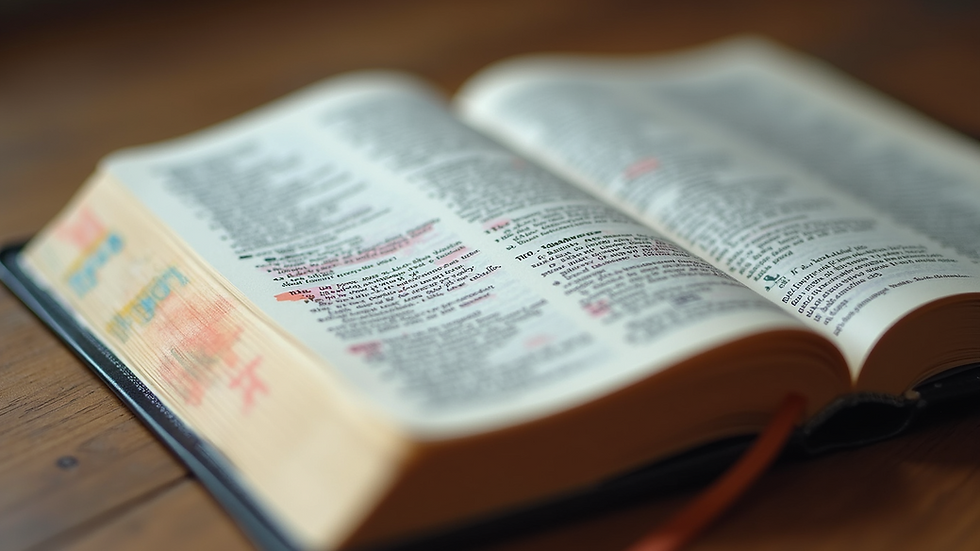How will the introduction of Chinese tariffs impact the pricing of Bibles in the United States?
- Joy Creative Bibles

- Apr 3, 2025
- 3 min read
The introduction of tariffs can have significant effects on industries we may not immediately think of, including the Bible market. A substantial number of Bibles sold in the United States are imported from China. With U.S.-China trade relations evolving, it is crucial to understand how these tariffs might impact Bible prices for both consumers and retailers.
The Background of Tariffs
Tariffs are taxes on imported goods designed to protect domestic industries by making foreign products costlier. In recent years, the U.S. has imposed tariffs on various imports from China. For example, tariffs have been set as high as 25% on specific categories, which affects the overall pricing of items like Bibles.
When tariffs are applied, the additional cost often gets passed down the supply chain. So, as tariffs increase, so too do the final prices that consumers pay for religious texts and other consumer goods.
Understanding the Bible Market
The Bible market is diverse, offering study Bibles, children's Bibles, and various specialty editions. A significant portion of these Bibles is manufactured in China due to lower production costs. For instance, if a standard study Bible costs $25 pre-tariff, a 25% increase due to tariffs could push that price to $31.25.
Many consumers assume that Bible prices are stable. However, various factors, including tariffs, shipping fees, and logistics, can affect the final retail price.
Potential Price Increases
Rising tariffs on imports from China could lead to unavoidable price hikes for Bibles. Retailers may have no choice but to pass these increased costs on to consumers. This trend is particularly concerning for churches and ministries that depend on affordable Bibles for their congregations. If prices rise, organizations with limited budgets may struggle to provide these essential materials.
For example, a church ordering 200 Bibles could see their costs rise from $5,000 to $6,250, making it more difficult for them to fulfill their mission.
The Ripple Effect on Publishers and Retailers
As tariffs push prices higher, publishers are likely to reassess their production strategies. Some may pivot to sourcing materials from countries with lower tariffs or find suppliers closer to home. This search for alternatives could disrupt the supply chain, potentially leading to short-term shortages of popular editions.
Retailers, particularly small independent bookstores, may face challenges. Larger retailers with diverse sources might manage better, but independent shops tend to rely on competitive pricing. With costs rising, they may find it harder to attract customers, which could impact their sales significantly.
Consumer Behavior and Adaptation
When faced with rising prices, consumer behavior tends to shift. Many may seek discounted or second-hand Bibles or turn to digital formats as more affordable options. For instance, a digital Bible could cost less than $10, compared to a potential $30 printed edition once tariffs take effect.
Additionally, some consumers might prioritize purchases from retailers known for fair pricing. Churches and organizations may need to adjust budgets, focusing on bulk buying or community efforts to reduce costs.
The Role of Non-Profits and Charitable Organizations
Non-profits that distribute Bibles will face the brunt of increased costs. Many operate on tight budgets, and even a small increase can limit their outreach. For example, if the price of a donated Bible increases from $2 to $2.50, a charity purchasing 1,000 Bibles will see a budget increase from $2,000 to $2,500.
With continuing demand for affordable Bibles among underserved communities, these organizations may need to boost fundraising efforts or collaborate with others to ensure access to Scripture remains uninterrupted.
Future Implications
As trade policies evolve, the cost of Bibles could fluctuate. Publishers and retailers must stay alert to changes and thoughtfully adapt their strategies. For consumers and organizations, being aware of pricing trends and resources available can help navigate these complexities.
Educational efforts about the changes in import costs can be beneficial for anyone involved in the Bible market.
Making Informed Purchases
In light of possible tariff increases, consumers should take charge of their purchasing decisions. Subscribing to newsletters from publishers or retailers can alert buyers to sales, discounts, or price adjustments due to new tariffs.
Participating in community-sharing programs can also help alleviate financial pressures. By organizing bulk purchases among local churches, groups can benefit from significant savings while ensuring that Bibles remain accessible.
Navigating Upcoming Challenges
The introduction of Chinese tariffs stands to affect Bible pricing in various ways. While the immediate reaction might focus on consumer costs, it is crucial to understand the broader consequences for publishers, retailers, and faith-based organizations.
As the industry grapples with these challenges, both awareness and adaptability will be vital. Staying informed and proactive allows individuals to access essential resources like Scripture, even amid a changing economic landscape. Being knowledgeable about potential costs will empower consumers and organizations alike, ensuring continued access to the Bibles they need.
.placeholder for image with appropriate alt text and caption.



Comments